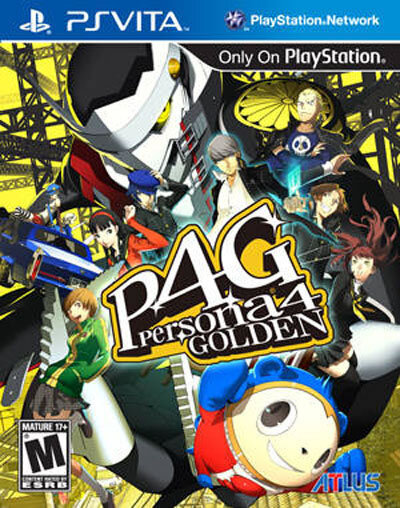- CLASSIC MAGAZINES
- REVIEW CREW
A show recapping what critics thought back
when classic games first came out! - NEXT GENERATION'S BEST & WORST
From the worst 1-star reviews to the best
5-stars can offer, this is Next Generation! - NINTENDO POWER (ARCHIVE)
Experience a variety of shows looking at the
often baffling history of Nintendo Power! - MAGAZINE RETROSPECTIVE
We're looking at the absolutely true history of
some of the most iconic game magazines ever! - SUPER PLAY'S TOP 600
The longest and most ambitious Super NES
countdown on the internet! - THEY SAID WHAT?
Debunking predictions and gossip found
in classic video game magazines! - NEXT GENERATION UNCOVERED
Cyril is back in this spin-off series, featuring the
cover critic review the art of Next Generation! - HARDCORE GAMER MAGAZING (PDF ISSUES)
Download all 36 issues of Hardcore Gamer
Magazine and relive the fun in PDF form!
- REVIEW CREW
- ELECTRONIC GAMING MONTHLY
- ELECTRONIC GAMING MONTHLY RANKS
From Mario to Sonic to Street Fighter, EGM
ranks classic game franchises and consoles! - ELECTRONIC GAMING MONTHLY BEST & WORST
Counting down EGM’s best and worst reviews
going year by year, from 1989 – 2009! - ELECTRONIC GAMING BEST & WORST AWARDS
11-part video series chronicling the ups and
downs of EGM’s Best & Worst Awards!
- ELECTRONIC GAMING MONTHLY RANKS
- GAME HISTORY
- GAME OVER: STORY BREAKDOWNS
Long-running series breaking down game
stories and analyzing their endings! - A BRIEF HISTORY OF GAMING w/ [NAME HERE]
Real history presented in a fun and pithy
format from a variety of game historians! - THE BLACK SHEEP
A series looking back at the black sheep
entries in popular game franchises! - INSTANT EXPERT
Everything you could possibly want to know
about a wide variety of gaming topics! - FREEZE FRAME
When something familiar happens in the games
industry, we're there to take a picture! - I'VE GOT YOUR NUMBER
Learn real video game history through a series
of number-themed episodes, starting at zero! - GREAT MOMENTS IN BAD ACTING
A joyous celebration of some of gaming's
absolute worst voice acting!
- GAME OVER: STORY BREAKDOWNS
- POPULAR SHOWS
- DG NEWS w/ LORNE RISELEY
Newsman Lorne Riseley hosts a regular
series looking at the hottest gaming news! - REVIEW REWIND
Cyril replays a game he reviewed 10+ years
ago to see if he got it right or wrong! - ON-RUNNING FEUDS
Defunct Games' longest-running show, with
editorials, observations and other fun oddities! - DEFUNCT GAMES QUIZ (ARCHIVE)
From online quizzes to game shows, we're
putting your video game knowledge to the test!- QUIZ: ONLINE PASS
Take a weekly quiz to see how well you know
the news and current gaming events! - QUIZ: KNOW THE GAME
One-on-one quiz show where contestants
find out if they actually know classic games! - QUIZ: THE LEADERBOARD
Can you guess the game based on the classic
review? Find out with The Leaderboard!
- QUIZ: ONLINE PASS
- DEFUNCT GAMES VS.
Cyril and the Defunct Games staff isn't afraid
to choose their favorite games and more! - CYRIL READS WORLDS OF POWER
Defunct Games recreates classic game
novelizations through the audio book format!
- DG NEWS w/ LORNE RISELEY
- COMEDY
- GAME EXPECTANCY
How long will your favorite hero live? We crunch
the numbers in this series about dying! - VIDEO GAME ADVICE
Famous game characters answer real personal
advice questions with a humorous slant! - FAKE GAMES: GUERILLA SCRAPBOOK
A long-running series about fake games and
the people who love them (covers included)! - WORST GAME EVER
A contest that attempts to create the worst
video game ever made, complete with covers! - LEVEL 1 STORIES
Literature based on the first stages of some
of your favorite classic video games! - THE COVER CRITIC
One of Defunct Games' earliest shows, Cover
Critic digs up some of the worst box art ever! - COMMERCIAL BREAK
Take a trip through some of the best and
worst video game advertisements of all time! - COMIC BOOK MODS
You've never seen comics like this before.
A curious mix of rewritten video game comics!
- GAME EXPECTANCY
- SERIES ARCHIVE
- NINTENDO SWITCH ONLINE ARCHIVE
A regularly-updated list of every Nintendo
Switch Online release, plus links to review! - PLAYSTATION PLUS CLASSIC ARCHIVE
A comprehensive list of every PlayStation
Plus classic release, including links! - RETRO-BIT PUBLISHING ARCHIVE
A regularly-updated list of every Retro-Bit
game released! - REVIEW MARATHONS w/ ADAM WALLACE
Join critic Adam Wallace as he takes us on a
classic review marathon with different themes!- DEFUNCT GAMES GOLF CLUB
Adam Wallace takes to the links to slice his way
through 72 classic golf game reviews! - 007 IN PIXELS
Adam Wallace takes on the world's greatest spy
as he reviews 15 weeks of James Bond games! - A SALUTE TO VAMPIRES
Adam Wallace is sinking his teeth into a series
covering Castlevania, BloodRayne and more! - CAPCOM'S CURSE
Adam Wallace is celebrating 13 days of Halloween
with a line-up of Capcom's scariest games! - THE FALL OF SUPERMAN
Adam Wallace is a man of steel for playing
some of the absolute worst Superman games! - THE 31 GAMES OF HALLOWEEN
Adam Wallace spends every day of October afraid
as he reviews some of the scariest games ever! - 12 WEEKS OF STAR TREK
Adam Wallace boldly goes where no critic has
gone before in this Star Trek marathon!
- DEFUNCT GAMES GOLF CLUB
- DAYS OF CHRISTMAS (ARCHIVE)
Annual holiday series with themed-episodes
that date all the way back to 2001!- 2015: 30 Ridiculous Retro Rumors
- 2014: 29 Magazines of Christmas
- 2013: 29 Questionable Power-Ups of Christmas
- 2012: 34 Theme Songs of Christmas
- 2011: 32 Game Endings of Christmas
- 2010: 31 Bonus Levels of Christmas
- 2009: 30 Genres of Christmas
- 2008: 29 Controls of Christmas
- 2007: 34 Cliches of Christmas
- 2006: 33 Consoles of Christmas
- 2005: 32 Articles of Christmas
- 2004: 31 Websites of Christmas
- 2003: 29 Issues of Christmas
- 2002: 28 Years of Christmas
- 2001: 33 Days of Christmas
- NINTENDO SWITCH ONLINE ARCHIVE
- REVIEW ARCHIVE
- FULL ARCHIVE
Persona 4 Golden
For as many hours as I spend with the typical role-playing hero, rarely do their adventures affect me on a personal level. Oh sure, there's lots of exciting action and quests that take me half-way around the world, but it's so far removed from my everyday life that it's hard to relate to the average Final Fantasy character. As a result, I find myself playing them for the sights and story, not because I'm emotionally connected to their plight.
As it turns out, Persona 4 Golden is not your typical role-playing game. The characters don't live in a far off land where everybody fights ogres and dragons; they are everyday kids trying to solve a mystery in modern day Japan. They have real lives that involve the sorts of things normal high schoolers put up with, like homework, after-school jobs, dating, etc. They are fully developed characters, the kinds of people I remember going to school with oh so many years ago. It just so happens that they also jump through a giant high-definition television to take on a world of bad guys.
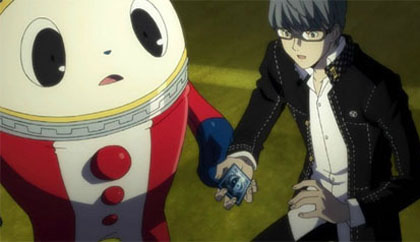
Much like past Persona entries, you play the new kid in school. In this case you are a good-natured boy from the big city, shipped away to his Uncle's house while his parents live abroad for a year. Our hero is disappointed to learn that his new surroundings are small, boring and mostly rainy. As somebody who grew up in a small town in the stormy Pacific Northwest, I can certainly identify with this boy's disposition.
Before long the new kid in school (who you get to name at the start) has a couple of new friends, including Chie (a tomboy with a mean kick) and Yosuke (another recent school transfer). When one of their friends goes missing, the three teens uncover a plot to kidnap and murder seemingly random people in their small town. Fearing the bumbling police won't be able to crack the confusing case, our hero decides to investigate these disappearances himself and save the day. What happens next is a wild adventure full of twists and turns you won't see coming.
To make things even stranger, the killer seems to be toying with the freaked-out townspeople. On rainy nights (and only rainy nights), the people of Inaba are able to watch a mysterious television channel that seems to predict the next victim. Not only does our hero witness a vision of his friend being kidnapped, but something (or somebody) nearly sucks him through his television set. Thankfully he wasn't able to fit all the way through; saved by a tiny dorm-sized standard definition TV.
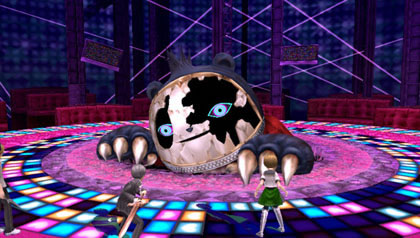
Rattled, our hero isn't quite sure what to think. He'll quickly learn that television sets are a portal to another world, one full of shadow monsters and other spooky aberrations. It's a hostile place with no discernable exits. Thankfully, the Scooby gang meets up with a cartoonish bear that is willing to help. But things are not as they appear and this bear has a few secrets of his own.
Persona 4 Golden is split up into a bunch of different dungeons, each based around the deep, dark secrets of Inaba's citizens. Take Kanji as an example. On the surface he's your typical rebellious high school drop-out that makes all the wrong choices. However, by jumping into the TV and digging into his deepest fears, we learn that this tough guy has another layer; he's hugely conflicted about his own sexuality. This world uses that against him, forcing Kanji to finally face his demons and accept himself for who he is.
Not only do these dungeons tell unique stories, but they look different from one character to the next. In the case of Kanji, the dungeon is based on a steamy bathhouse. Other dungeons include a strip club, castle, secret lab and, a personal favorite, an old 8-bit video game. For the most part these themes are only cosmetic, so don't expect sweeping changes to the gameplay. If you take away the Disney license and instead opt for depressing fear-based nightmare dungeons, then Persona 4 is exactly like a turn-based Kingdom Hearts.
But before we journey too deep into the strip club-themed dungeon, let's jump out of the TV set and back into boring old Inaba. While fighting shadow monsters may be fun, it's here in the real world where things actually get done. Persona 4 Golden takes us through a full year of this teenager's life, from April 2011 until March of this year. In that time we'll see him bond with friends, take on outside jobs, suffer through endless classes, study at night, babysit your cousin, go camping, play sports and, well, just about anything else a normal teenage boy would do.
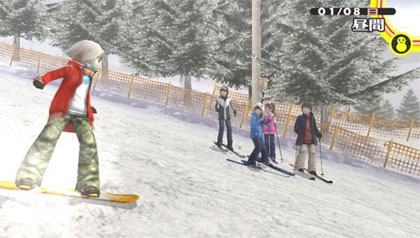
In a lot of ways, Persona 4 Golden is a life simulator. You are bound to the calendar and a lot of people are relying on you. It's easy to be juggling several things, only to have the added stress of fighting shadow monsters in dungeons. But it's all worth it, because all of these activities directly impact your stats. Listening to your foul-mouthed teacher rattle on will give you knowledge, which will help you ace your driving test. Driving your motorcycle around at night increases your courage, which in turn gives you a better shot at asking the hottest girl in town out on a date. All this makes you a better fighter ... and friend.
As it turns out, being able to quickly shift between worlds is the key to this game's success. The turn-based dungeon worlds never become too repetitive because you can quickly jump out, go on a date and spend the rest of the night reading a book at home. At the same time, the life simulator stuff never becomes too long winded, as you can always halt the story and go back to killing shadow monsters. There are genuinely compelling reasons to spend your time in both worlds, each manages to scratch a completely different (and equally compelling) itch.
Back inside the television, our hero uses his different personas to battle hordes of monsters. These personas are large creatures you summon to fight on your behalf. In battle you can switch between personas, as well as use normal melee attacks to get the job done. The combat is turn-based, though not slow and plodding like some Japanese role-playing games. Set to the default, players only control one character. However, at any time you can change the tactics and take full control over two, three or even four or your teammates. But beware, if the hero dies, it is game over for everybody.
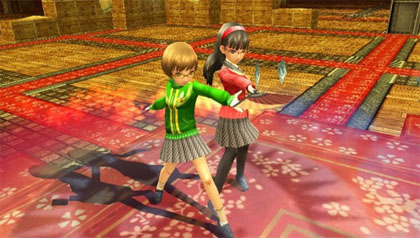
The speedy combat is aided with a number of interesting wrinkles. For example, each enemy has a weakness that you must find. Hit him with a strong attack and the enemy will fall on his butt, allowing the full team to pile on for a few seconds. There's also the "Rush Mode," which speeds everything up and automatically chooses each character's attacks. This is great for those times when you're grinding through low level monsters.
Speaking of monsters, Persona 4 Golden has some of the best RPG enemy designs. These aren't your typical fantasy orcs and ghouls, but rather are inventive creatures unlike anything I've seen before. Many of them play homage to modern pop-culture, though often in unexpected and bizarre ways. Instead of spending the next three thousand words describing each and every one of my favorite Persona 4 villains, I invite you to take a look at the pictures attached to this review. Needless to say, the art direction is second to none.
Persona 4 started its life as a late generation PlayStation 2 game. How late? Let's just say that the PlayStation 3 had been out for two full years by the time this game shipped to stores. As a result, many RPG-loving gamers (including myself) missed out on its greatness the first time around. Persona 4 Golden shines on the PS Vita. Not only is it one of the greatest role-playing games of all time, but the visuals can easily stack up with the best of the system. You would never know this game is four years old, a testament to how good Persona 4 really is.
This PS Vita port adds a bunch of new locations to explore, people to talk to, jobs to take on, and so on so forth. If you're looking for a detailed description of what's new, what's changed and all the reasons why you should play through this Persona sequel for a second time, then this is not the review for you. Sorry that it took me fourteen hundred words to get to that warning. This is a review about how emotionally impactful the lives of Chie, Yosuke and Yukiko are to me. These are characters I love and care about, despite their many flaws. Their stories spoke to me personally and I enjoyed every second of their journey. Even the occasional frustrating dungeon.
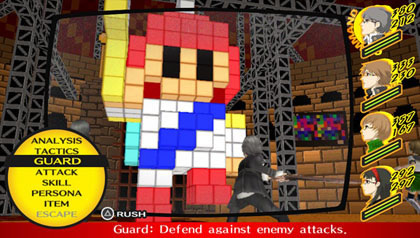
Atlus did add some touchscreen content exclusive to the Vita. The good news is that none of the core gameplay has been tweaked; everything is controlled with the analog sticks and face buttons. However, there are some new online features that can be accessed by hitting various sections of the screen. One thing you can do is find out the choices everybody else made on a particular day. Hit another side of the screen and you'll call out for help when stuck in a dungeon. Occasionally you'll be able to pop up a menu that allows you to access game commercials and music videos. None of this is essential to the Persona 4 experience, but it's a fun addition.
Persona 4 Golden is a long game. You're looking at 60+ hours just to complete the main storyline. Much more than that if you want to do and see everything. Thankfully none of it feels like filler. Each dungeon peels off a little piece of the mystery, which kept me coming back for more. I couldn't wait to see what happened next in the real world and television world. Every day brought a brand new wrinkle to the story.
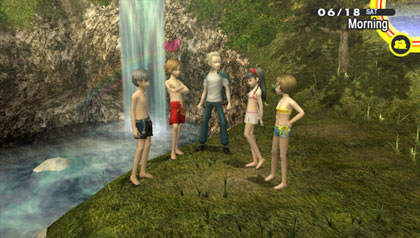
As good as the look and gameplay is, the reason all this works is because the writing is so sharp. The game is ready to mock the cliches of the genre, as well as let the teenagers be teenagers. Not everything that comes out of their mouth is witty, but it's believable and well-acted. It's also incredibly funny, which isn't the kind of thing you expect from most RPGs. Sometimes corny and often bizarre, Persona 4 is constantly interesting and full of surprises. These are endearing characters, even when they're being brats.
It doesn't matter that it's a port of a four year old PlayStation 2 game, Persona 4 Golden is the best role-playing game of the year. It's also the best handheld game of the year and may very well be a real contender for best game of the year. It's a masterpiece that will keep you glued to your PS Vita for months to come. This is the kind of adventure you'll never forget, featuring characters you actually want to be around. At no point will you regret your decision to move to Inaba for the year.
HOME |
CONTACT |
NOW HIRING |
WHAT IS DEFUNCT GAMES? |
NINTENDO SWITCH ONLINE |
RETRO-BIT PUBLISHING
Retro-Bit |
Switch Planet |
The Halcyon Show |
Same Name, Different Game |
Dragnix |
Press the Buttons
Game Zone Online | Hardcore Gamer | The Dreamcast Junkyard | Video Game Blogger
Dr Strife | Games For Lunch | Mondo Cool Cast | Boxed Pixels | Sega CD Universe | Gaming Trend
Game Zone Online | Hardcore Gamer | The Dreamcast Junkyard | Video Game Blogger
Dr Strife | Games For Lunch | Mondo Cool Cast | Boxed Pixels | Sega CD Universe | Gaming Trend
Copyright © 2001-2025 Defunct Games
All rights reserved. All trademarks are properties of their respective owners.
All rights reserved. All trademarks are properties of their respective owners.










